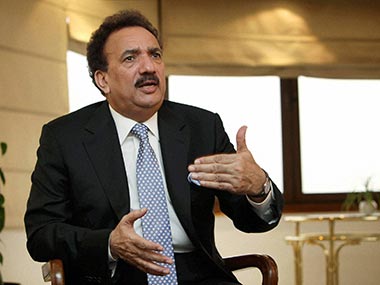 New Delhi, December 16: Pakistani Interior Minister Rehman Malik claimed that Lashkar-e-Taiba operative Abu Jundal, who was deported from Saudi Arabia, was an agent of Indian intelligence agencies, a charge rubbished by the Home Ministry.
New Delhi, December 16: Pakistani Interior Minister Rehman Malik claimed that Lashkar-e-Taiba operative Abu Jundal, who was deported from Saudi Arabia, was an agent of Indian intelligence agencies, a charge rubbished by the Home Ministry.
“We are also puzzled. Abu Jundal was a known criminal…He was an agent of Indian intelligence agency (wo kisi intelligence agency, Indians ka, ek source bhi raha). He himself is saying. We are not saying. We have seen records,” Malik said during an interaction with reporters.
Jundal is one of the key accused in the Mumbai terror attack case and was allegedly present in the control room set up by the Pakistan-based terror outfit during the three day mayhem in Mumbai in 2008.
Jundal was in the custody of Saudi authority for one year during which Pakistan had mounted diplomatic pressure as it felt he may spill the beans about state actors being involved in the 26/11 attack, a senior official said.
Malik said apart from Jundal, there were two others who were Indians who had gone to Pakistan.
“We are puzzled why did they go to Pakistan…it is a matter of records,” he said without elaborating.
The Pakistani leader did not clarify on what basis he was making this statement.
Jundal’s fake Pakistani passport and fake Pakistani national identity card were also recovered from his possession.
Malik said Pakistan was trying to figure out whether non-state actors from the two sides were acting at the instance of a third power.
“You are aware that things had taken an alarming turn, with both countries massing their troops on the border. Things would have been worse if the leadership on both sides had not shown maturity,” he said.
Malik said, “We have to forget that India and Pakistan are enemies… we are converging on Kashmir issue. It is part of composite dialogue… we are not forgetting 26/11… I am not saying forget the incident. I am only saying that forget the feeling of animosity. Let us create an era of brightness”.





Comments
Add new comment